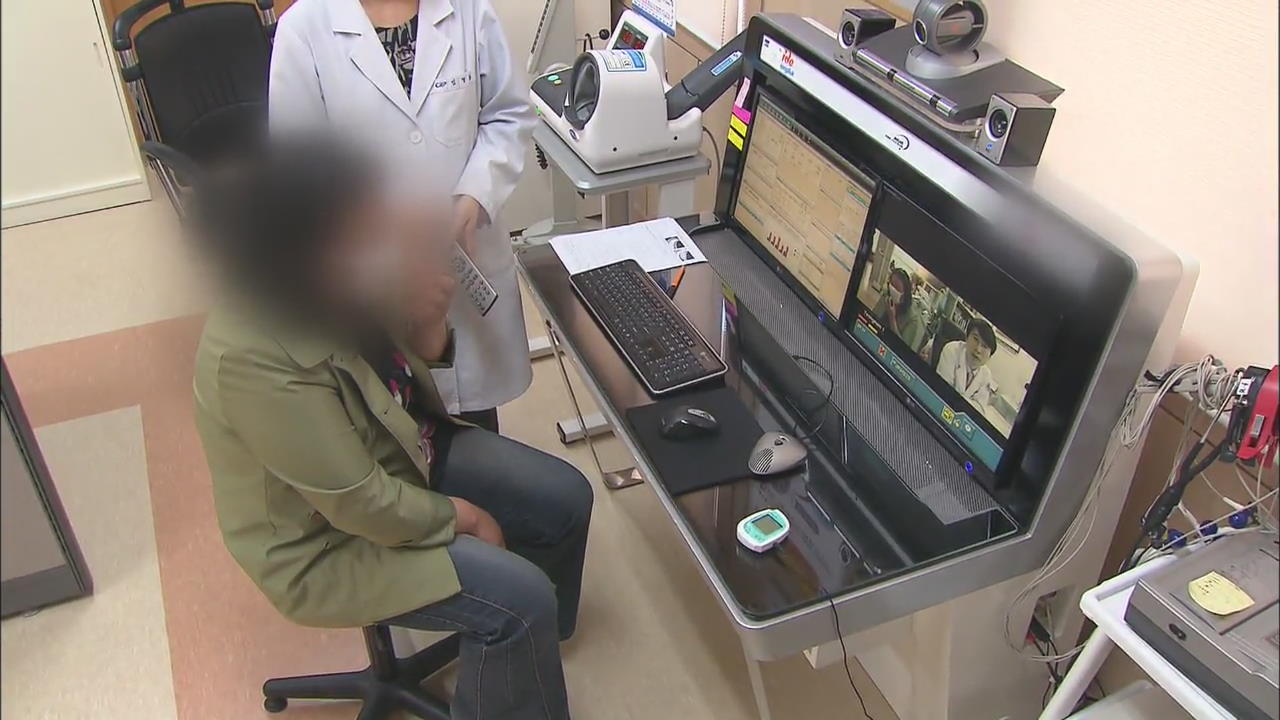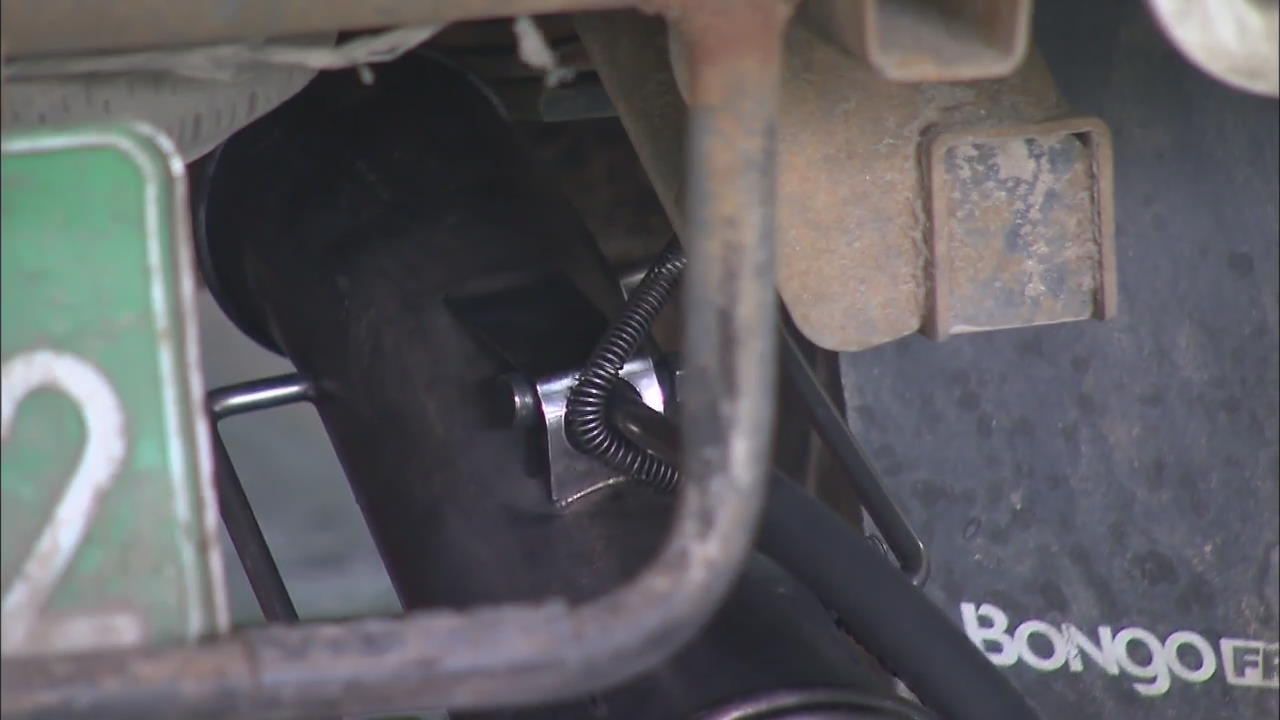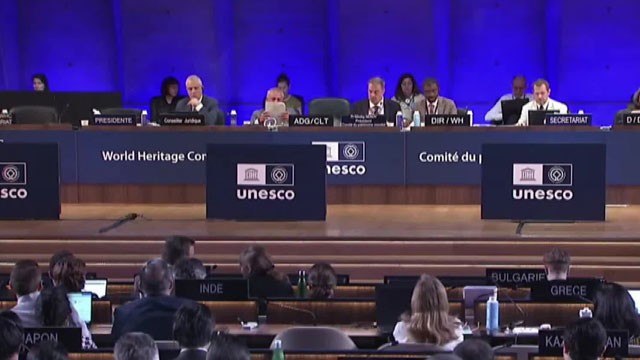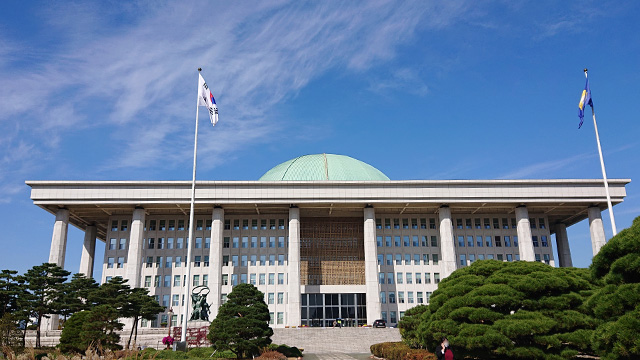Remote Medicine
입력 2016.08.05 (14:09)
수정 2016.08.05 (14:31)
읽어주기 기능은 크롬기반의
브라우저에서만 사용하실 수 있습니다.
[Anchor Lead]
The government has decided to expand the pilot program for remote medical service starting later this year. It remains to be seen whether the government decision can speed up the project, which has been stalled for the past ten years because of strong protests from the medical industry.
[Soundbite] "I called because of throat pain. (Okay, let's see the patient's overall condition.)"
[Pkg]
An army doctor examines a sick soldier through a video call. This is an example of the so-called 'remote diagnosis service,' which allows medical personnel to check a patient's pulse and blood pressure in real time. The Ministry of Health and Welfare decided in 2006 to launch the remote medical service program. But pertinent bills haven't even entered the legislative process in the 10 years since. The new program was met with strong opposition from the medical sector, which raised safety issues and claimed the new service would undermine small neighborhood clinics. Nonetheless, the pilot project finally got off the ground two years ago, and the Ministry has decided to expand it further starting in October. The program is currently in operation at six nursing facilities, but some 680 nursing homes with a capacity of more than 70 occupants are eligible to apply as well. The government has also decided to extend the pilot program to 20 islands and 63 military bases. President Park Geun-hye visited a senior nursing center where the program is under way to ask for the medical sector's active participation.
[Soundbite] Pres. Park Geun-hye : "I think this is a necessary service for immobile senior citizens."
The government plans to advertise the merits of the remote diagnosis system by expanding the pilot program, but it remains to be seen whether the project can gain traction despite the strong protests from the medical service industry and the opposition camp.
The government has decided to expand the pilot program for remote medical service starting later this year. It remains to be seen whether the government decision can speed up the project, which has been stalled for the past ten years because of strong protests from the medical industry.
[Soundbite] "I called because of throat pain. (Okay, let's see the patient's overall condition.)"
[Pkg]
An army doctor examines a sick soldier through a video call. This is an example of the so-called 'remote diagnosis service,' which allows medical personnel to check a patient's pulse and blood pressure in real time. The Ministry of Health and Welfare decided in 2006 to launch the remote medical service program. But pertinent bills haven't even entered the legislative process in the 10 years since. The new program was met with strong opposition from the medical sector, which raised safety issues and claimed the new service would undermine small neighborhood clinics. Nonetheless, the pilot project finally got off the ground two years ago, and the Ministry has decided to expand it further starting in October. The program is currently in operation at six nursing facilities, but some 680 nursing homes with a capacity of more than 70 occupants are eligible to apply as well. The government has also decided to extend the pilot program to 20 islands and 63 military bases. President Park Geun-hye visited a senior nursing center where the program is under way to ask for the medical sector's active participation.
[Soundbite] Pres. Park Geun-hye : "I think this is a necessary service for immobile senior citizens."
The government plans to advertise the merits of the remote diagnosis system by expanding the pilot program, but it remains to be seen whether the project can gain traction despite the strong protests from the medical service industry and the opposition camp.
■ 제보하기
▷ 카카오톡 : 'KBS제보' 검색, 채널 추가
▷ 전화 : 02-781-1234, 4444
▷ 이메일 : kbs1234@kbs.co.kr
▷ 유튜브, 네이버, 카카오에서도 KBS뉴스를 구독해주세요!
- Remote Medicine
-
- 입력 2016-08-05 14:14:14
- 수정2016-08-05 14:31:28

[Anchor Lead]
The government has decided to expand the pilot program for remote medical service starting later this year. It remains to be seen whether the government decision can speed up the project, which has been stalled for the past ten years because of strong protests from the medical industry.
[Soundbite] "I called because of throat pain. (Okay, let's see the patient's overall condition.)"
[Pkg]
An army doctor examines a sick soldier through a video call. This is an example of the so-called 'remote diagnosis service,' which allows medical personnel to check a patient's pulse and blood pressure in real time. The Ministry of Health and Welfare decided in 2006 to launch the remote medical service program. But pertinent bills haven't even entered the legislative process in the 10 years since. The new program was met with strong opposition from the medical sector, which raised safety issues and claimed the new service would undermine small neighborhood clinics. Nonetheless, the pilot project finally got off the ground two years ago, and the Ministry has decided to expand it further starting in October. The program is currently in operation at six nursing facilities, but some 680 nursing homes with a capacity of more than 70 occupants are eligible to apply as well. The government has also decided to extend the pilot program to 20 islands and 63 military bases. President Park Geun-hye visited a senior nursing center where the program is under way to ask for the medical sector's active participation.
[Soundbite] Pres. Park Geun-hye : "I think this is a necessary service for immobile senior citizens."
The government plans to advertise the merits of the remote diagnosis system by expanding the pilot program, but it remains to be seen whether the project can gain traction despite the strong protests from the medical service industry and the opposition camp.
The government has decided to expand the pilot program for remote medical service starting later this year. It remains to be seen whether the government decision can speed up the project, which has been stalled for the past ten years because of strong protests from the medical industry.
[Soundbite] "I called because of throat pain. (Okay, let's see the patient's overall condition.)"
[Pkg]
An army doctor examines a sick soldier through a video call. This is an example of the so-called 'remote diagnosis service,' which allows medical personnel to check a patient's pulse and blood pressure in real time. The Ministry of Health and Welfare decided in 2006 to launch the remote medical service program. But pertinent bills haven't even entered the legislative process in the 10 years since. The new program was met with strong opposition from the medical sector, which raised safety issues and claimed the new service would undermine small neighborhood clinics. Nonetheless, the pilot project finally got off the ground two years ago, and the Ministry has decided to expand it further starting in October. The program is currently in operation at six nursing facilities, but some 680 nursing homes with a capacity of more than 70 occupants are eligible to apply as well. The government has also decided to extend the pilot program to 20 islands and 63 military bases. President Park Geun-hye visited a senior nursing center where the program is under way to ask for the medical sector's active participation.
[Soundbite] Pres. Park Geun-hye : "I think this is a necessary service for immobile senior citizens."
The government plans to advertise the merits of the remote diagnosis system by expanding the pilot program, but it remains to be seen whether the project can gain traction despite the strong protests from the medical service industry and the opposition camp.
이 기사가 좋으셨다면
-
좋아요
0
-
응원해요
0
-
후속 원해요
0












![[속보] 순직 해병 특검 “오늘 오후 박정훈 대령 참고인 조사”](/data/layer/904/2025/07/20250716_MUM2IP.jpg)

![[단독] 김건희 특검, ‘공천 개입’ 관련 김영선 전 의원 소환 통보…일정 조율 중](/data/news/2025/07/16/20250716_p7hDHF.jpg)


이 기사에 대한 의견을 남겨주세요.